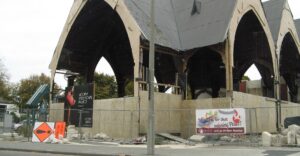
Rethinking the Definition and Development of ‘Labor’
The way the world ‘works’ is decidedly different now than it was just four years ago. In some cases, jobs that used to sustain comfortable lifestyles no longer exist. In other cases, newly recognized labor demands have yet to find the workforce needed to fill those openings. The challenge now presented is to clarify the definitions of those new forms of ‘work’ and then find the laborers with the skills and abilities to perform those functions. And when that labor force does not yet exist, the ‘work’ becomes the task of developing the systems and strategies that will train it, employ it, and then build it. And that work requires a community effort.
The Economic and Workforce Development (EWD) division of Pasadena City College (PCC) is proud to host its fifth annual Future of Work Conference (FOW) on October 26, 2023, in the Creveling Lounge on campus. This year, our education, industry, and governance experts will weigh in on how, as a community, we can build our future workforce by better leveraging our existing resources: state and federal funds and initiatives, forward-leaning business activities, and the network of excellence contained within California’s community college system.
Many Voices. One Goal: Revolutionizing Student Workforce Pathways
It’s a unique circumstance when virtually all players within a single sector – in this case, ‘workforce development’ (WFD) – are facing the same conundrum. The ‘tricky question‘ here that faces each separate WFD entity is this: “how do we maximize the values of our intrinsic assets in conjunction with those of other organizations to establish a single system that works for and benefits us all? And also benefits our community?”
Fortunately, many California-based agencies are already evaluating the situation from their own unique perspectives. The State of California has developed numerous organizational offices to manage and guide the activities within specific industrial, social, and governmental spheres, each of which focuses on a particular WFD element. The FOW will bring several of the leaders of these agencies together to share what they know – and don’t know – about today’s WFD concerns.
Asking the Hard Questions
Fundamentally, the concerns to be addressed are those that arise in every challenge:
WHAT needs to be done?
WHY is it critical?
WHERE is it required?
WHEN does it start?
WHO is going to do it?
The issues presented to the two FOW panels are focused primarily on the efforts of California’s Community Colleges (CCC) and how they might reimagine themselves to provide solutions to these issues. The ‘colleges’ (116 state-wide, 19 in LA County) are ‘an entity’ in and of themselves. Collectively, they serve almost two million students each year. As a unit, they represent the State’s talent pool for virtually every kind of work. Consequently, as the ‘seed’ location of today’s and tomorrow’s workforce, what the schools do together and individually can and will have a significant impact on the economic future of every region.
The conference asks its panelists to offer their insights into three overarching questions, each of which needs answers to all five of the above-referenced concerns:
-
-
- How can we better align the goals and systems of California’s workforce development programs, California community college career technical education, and trade unions to meet current and future WFD needs?
- What do we do now to adapt our best-in-class student success innovations in the California community college academic system to meet student and employer needs?
- How can community colleges and their regional collaborators best align national and state priorities with industry sector priorities to stimulate the growth of well-paying jobs that keep America globally competitive?
-
Addressing these objectives is a big ‘ask’ that will require all participants to have:
a thorough understanding of the foundational WFD tenets that guide everyone;
an awareness of where opportunities for WFD growth exist, and
a comprehension of the barriers that can or will impede progress if left in place.
Accordingly, PCC EWD has invited top talent in several agencies to bring their expertise to the table.
Agency Leaders Collaborating for Change
As of this edition of the Pulse, conference participants will be representing these notable organizations:
From the schools:
Pasadena City College
The California Community College Chancellors’ Office (CCCCO)
From the government:
elected officials and representatives from
the California Labor Federation (AFL-CIO)
the California Labor & Workforce Development Agency
the State of California Apprenticeship and Workforce Innovation Unit at the CA Department of Industrial Relations and
LA Federation of Labor
From the public sector:
The James Irvine Foundation
Apple
Invitations to potential panelists are still outstanding, so the full scope of the participant roster remains in development.
Not least significant to the day will be a presentation to the Conference’s inaugural ‘California Changemaker,’ an individual whose career, WFD inputs, and industrial, governmental, or social successes have provided leadership and guidance on important WFD issues and therefore deserves recognition for that effort. Not surprisingly, the candidate list for this prestigious award is long, and finalizing the selection will take some time.
Revolutions in economics and social dynamics are altering both our present industrial and economic complex, as well as the plans and strategies we thought we had in place for the future. Our society can’t continue to operate on outdated game plans that can’t serve the emerging needs of today’s technology-based infrastructure. And no single entity has all the answers, resources, or opportunities to move everyone forward. As the adage says, ‘it takes a village …. ,’ and the PCC EWD Future of Work Conference is inviting all ‘village’ members to join in strategizing where we want to go and how we intend to get there.


